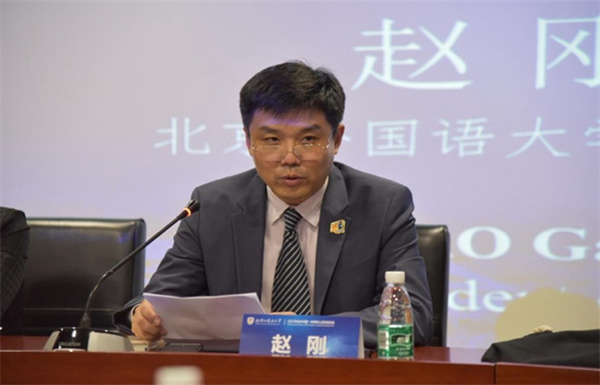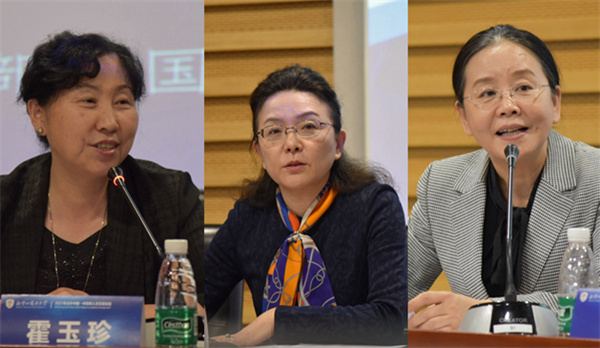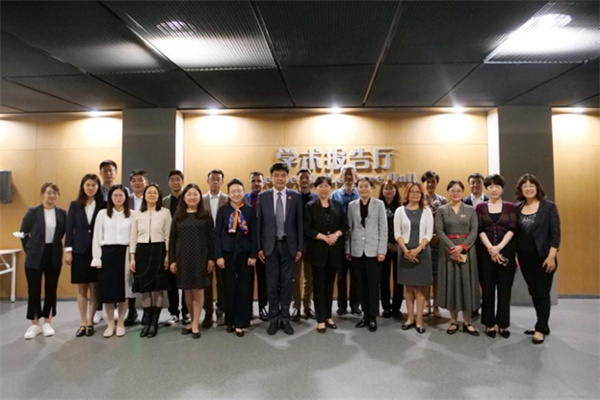- Research
- Research Centers
- Journals
- Admission
- Introduction
- Programs
- Application
- Alumni & Giving
- Alumni Club
- Giving
The BFSU Forum for China-CEEC Cultural Exchanges was held by the Central and Eastern European Studies Centre and the School of European Languages and Cultures of Beijing Foreign Studies University (BFSU) on Sept 24. Representatives from the Ministry of Foreign Affairs (MFA), the China Education Association for International Exchange (CEAIE), the China Scholarship Council (CSC) and BFSU attended the opening ceremony.
The ceremony was presided over by Professor Ke Jing, dean of BFSU’s School of European Languages and Cultures.

Zhao Gang, a member of the standing committee of the CPC BFSU committee and vice-president of the university, speaks at the BFSU Forum for China-CEEC Cultural Exchanges on Sept 24.
Zhao Gang, a member of the standing committee of the CPC BFSU committee and vice-president of the university, extended a warm welcome to the attendees. He pointed out that BFSU has combined its own development with the strategic needs of the nation and made great contributions to China’s international exchanges and the cause of reform and opening up during the past 80 years.
Zhao said BFSU has launched 15 majors to teach Central and Eastern European languages. Outstanding scholars from the university have made contributions in Central and Eastern Europe studies by participating in the construction of the China-CEEC Publishing Association and applying for high-level research topics.
“China and Central and Eastern European countries have achieved fruitful results in education cooperation. With the theme of education and cultural exchanges, this forum aims to help both sides make innovations and constantly deepen exchanges in this sector,” Zhao said.

Huo Yuzhen (L), special representative of China-CEEC Cooperation at the MFA, Fu Bo (C), director of the Department of International Cooperation of CEAIE, and Long Man (R), director of the Division of European, Asian and African Affairs of the CSC, speak at the BFSU Forum for China-CEEC Cultural Exchanges on Sept 24.
Huo Yuzhen, special representative of China-CEEC Cooperation at the MFA, said China has a long history of cooperating with Central and Eastern European countries. The two sides have formed an all-around and multi-level cooperation framework covering multiple fields. In the post-epidemic era, both sides should innovate their collaboration, explore new ways of cooperating in education, improve the quality of language teaching, strengthen basic research, effectively realize the transformation of achievements, and improve their translation ability to serve bilateral economic and social development.
Fu Bo, director of the Department of International Cooperation of CEAIE, said that China and Central and Eastern European countries have achieved win-win cooperation. Both sides have formed institutionalized education dialogues, strengthened joint scientific research projects, explored possibilities for cooperation and maximized the effect of various platforms to promote interconnection and mutual trust.
Fu said she hopes the two sides will explore new ways of cooperating, cultivate more international talents and realize mutually beneficial cooperation.
Long Man, director of the Division of European, Asian and African Affairs of the CSC, introduced the functions of the council and the situation of China’s government-sponsored overseas education to Central and Eastern European countries. Long suggested that both sides should further integrate resources and build collaborative projects.
Chinese and foreign experts delivered keynote speeches after the opening ceremony.
Maria Stojcheva, vice-rector of Sofia University St. Kliment Ohridski, delivered an online speech. She started with the APPD to stress the importance of language learning, reviewed Bulgaria’s history in building diplomatic ties with China, introduced educational cooperation projects such as Eurasia and Transform Europe, and called for mutual trust and exchanges in bilateral cooperation.
Hamar Imre, vice-president of Eötvös Loránd University, said that with the deepening of the Belt and Road Initiative and the issuance of Hungary’s policy of opening up to China, the cooperation between both sides has been enhanced. He praised BFSU’s achievements in teaching Chinese in Hungary, including setting up Confucius Institutes, teaching Chinese as a second foreign language and compiling Chinese-Hungarian dictionaries.
Liu Zuokui, deputy director of the Institute of European Studies at the Chinese Academy of Social Sciences, gave an online speech on the topic “rethinking the theory of China-CEEC cooperation” in which he reviewed previous opinions and explained his own theory from the perspectives of concept, function and technology.
Jin Limin, director of the BFSU Office of Confucius Institutes, delivered a speech titled “promoting cultural understanding through language communication”. She emphasized the importance of language competence and introduced international Chinese education cooperation between China and Central and Eastern European countries and the functions of Confucius Institute in providing Chinese teaching services, facilitating multicultural understanding and promoting educational exchanges between China and foreign countries.

Experts and scholars attend the BFSU Forum for China-CEEC Cultural Exchanges on Sept 24.
The forum attracted more than 40 experts and scholars from renowned universities and research institutions at home and abroad. During a sub-forum, guests exchanged views on the four topics of “China-CEEC cultural exchanges in the post epidemic era”, “China-CEEC talent training cooperation”, “China-CEEC scientific research cooperation” and “China-CEEC higher education research”.
At the closing ceremony, Professor Ding Chao from the BFSU’s School of European Languages and Cultures gave a concluding speech. He spoke highly of the latest research results displayed by scholars who attended the forum, and affirmed the role of China-CEEC cooperation in bringing people together.